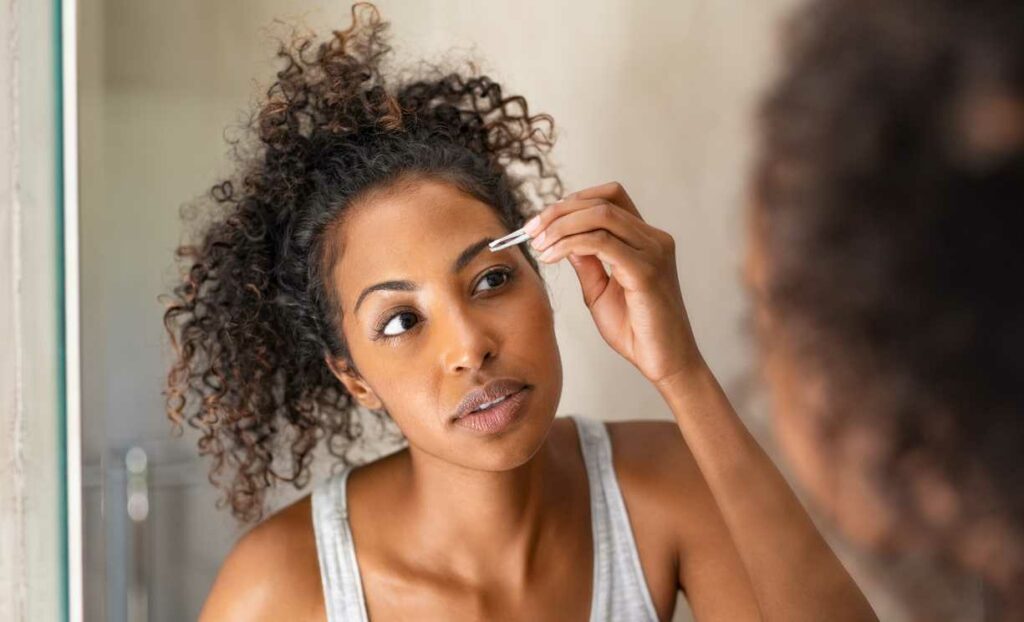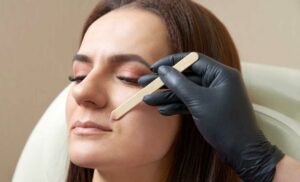Polycystic Ovary Syndrome (PCOS) brings with it a myriad of challenges, and one of the common and distressing symptoms is excess facial hair growth, known as hirsutism. This can significantly impact the self-esteem and confidence of individuals with PCOS. In this blog, we’ll explore the causes of facial hair growth in PCOS, the emotional aspects of dealing with hirsutism, and effective methods for PCOS facial hair removal.
Contents
Understanding PCOS And Facial Hair Growth
Polycystic Ovary Syndrome (PCOS) is a hormonal disorder that affects people with ovaries. One common and challenging symptom of PCOS is the excessive growth of facial hair, known as hirsutism. This occurs due to an imbalance in hormones, particularly elevated levels of testosterone. The higher levels of male hormones can lead to the growth of coarse and dark hair on areas of the face where men typically grow facial hair.
PCOS disrupts the usual hormonal balance, and the excess androgens (male hormones) stimulate the hair follicles, causing unwanted facial hair. Dealing with this symptom not only involves finding effective methods for facial hair removal but also addressing the emotional impact it can have on individuals’ self-esteem and confidence.
Other Symptoms Of PCOS
Polycystic Ovary Syndrome (PCOS) is a complex hormonal disorder that can manifest with a variety of symptoms. While not every individual with PCOS will experience the same set of symptoms, common signs and features include:
- Irregular Menstrual Cycles: PCOS often leads to irregular periods or the absence of menstruation. The hormonal imbalances disrupt the normal menstrual cycle.
- Ovulatory Dysfunction: Many women with PCOS may experience irregular or absent ovulation, affecting fertility and menstrual regularity.
- Polycystic Ovaries: As the name suggests, PCOS is associated with the presence of multiple small cysts on the ovaries. These cysts are actually immature follicles and can be detected through imaging tests like ultrasound.
- Excess Androgens: Elevated levels of androgens, often referred to as male hormones, can lead to symptoms such as hirsutism (excessive facial or body hair), acne, and male-pattern baldness.
- Acne and Oily Skin: The increased androgen levels in PCOS can contribute to acne and oily skin, affecting the complexion.
- Insulin Resistance: PCOS is often associated with insulin resistance, which can lead to elevated blood sugar levels and an increased risk of type 2 diabetes.
- Weight Gain or Difficulty Losing Weight: Insulin resistance can contribute to weight gain, and many women with PCOS find it challenging to lose weight.
- Acanthosis Nigricans: Darkening and thickening of the skin, particularly in skin folds like the neck or armpits, may occur due to insulin resistance.
- Fatigue: Hormonal imbalances and disrupted sleep patterns, often associated with PCOS, can contribute to feelings of fatigue.
- Mood Swings: Hormonal fluctuations in PCOS can affect mood, leading to symptoms such as mood swings, anxiety, or depression.
- Sleep Apnea: PCOS is linked to an increased risk of sleep apnea, a condition characterized by interrupted breathing during sleep.
- Headaches: Some women with PCOS may experience headaches, potentially linked to hormonal fluctuations and insulin resistance.
Treatment For PCOS Hair Growth
The treatment for facial hair removal related to Polycystic Ovary Syndrome (PCOS), known as hirsutism, involves addressing the underlying hormonal imbalances and managing the symptoms. Here are some approaches commonly used in the treatment of PCOS-related hair growth:
- Hormonal Birth Control: Oral contraceptives containing estrogen and progestin are often prescribed to regulate menstrual cycles and reduce androgen production. This, in turn, can help alleviate hirsutism and prevent further hair growth.
- Anti-Androgen Medications: Medications that block the effects of androgens or reduce their production may be prescribed. Spironolactone is a common anti-androgen medication that can be effective in reducing hirsutism.
- Topical Creams: Prescription creams containing eflornithine can be applied to the affected areas to slow down the growth of facial hair.
- Laser Hair Removal: Laser therapy targets the hair follicles, reducing hair growth over time. It’s an effective method for long-term hair reduction, but multiple sessions are usually required.
- Electrolysis: Electrolysis is a method of permanent hair removal. It involves the use of an electric current to destroy the hair follicle. While effective, it can be time-consuming and may require several sessions.
PCOS Facial Hair Removal Techniques
PCOS can lead to excess hair growth, known as hirsutism, which may affect the face, chest, back, or other areas. While addressing the underlying hormonal imbalances is crucial, various hair removal techniques can help manage the symptoms. Here are some commonly used PCOS hair removal techniques:
- Shaving: Shaving is a quick and easy method for removing unwanted hair. It provides immediate results but is a temporary solution, as hair grows back relatively quickly.
- Waxing: Waxing involves applying hot or cold wax to the skin and then pulling it off, along with the hair. It provides longer-lasting results compared to shaving but may be painful and can cause skin irritation.
- Threading: Threading is an ancient hair removal technique that uses a twisted cotton thread to trap and pull out individual hairs. It is precise and effective for shaping eyebrows and removing facial hair.
- Depilatory Creams: Depilatory creams contain chemicals that break down the structure of the hair, making it easier to wipe away. They offer a painless option for hair removal but may cause skin irritation in some individuals.
- Laser Hair Removal: Laser therapy uses concentrated light to target and damage hair follicles, inhibiting future hair growth. It is a long-term solution that requires multiple sessions but can significantly reduce hair over time.
- Electrolysis: Electrolysis is a permanent hair removal method that involves using an electric current to destroy the hair follicle. It is effective but can be time-consuming and may require multiple sessions.
- Dermaplaning: Dermaplaning involves using a sterile surgical blade to gently exfoliate the skin and remove fine facial hair. It can provide a smoother complexion and temporary hair reduction.
- At-Home Laser Devices: Some at-home devices use laser technology to target hair follicles. While not as powerful as professional treatments, they can offer a convenient option for ongoing maintenance.
Home Remedies For PCOS Hair Growth
Home remedies for managing hirsutism, the excessive hair growth often associated with PCOS, focus on promoting hormonal balance, reducing inflammation, and supporting overall well-being. While these remedies may provide some relief, it’s important to consult with a healthcare professional to ensure they align with your treatment plan. Here are some home remedies that individuals with PCOS-related hirsutism may consider:
- Spearmint Tea: Some studies suggest that spearmint tea may have anti-androgen effects, potentially helping to reduce excess hair growth. Drinking a cup of spearmint tea daily is a simple home remedy that some women find beneficial.
- Flaxseeds: Flaxseeds contain lignans, which may have anti-androgenic properties. Adding ground flaxseeds to smoothies, yogurt, or salads can be an easy way to incorporate them into your diet.
- Saw Palmetto: Saw palmetto is an herb that some people use to manage hormonal imbalances. It’s available in supplement form, but it’s important to consult with a healthcare provider before taking any herbal supplements.
- Chromium Supplements: Some studies suggest that chromium supplementation may help improve insulin sensitivity. Chromium is found in small amounts in foods like broccoli, grape juice, and whole grains.
- Cinnamon: Cinnamon has been studied for its potential benefits in improving insulin sensitivity. Consider adding cinnamon to your diet by sprinkling it on oatmeal, yogurt, or in your morning coffee.
- Turmeric: Curcumin, the active compound in turmeric, has anti-inflammatory properties. Incorporating turmeric into your cooking or drinking turmeric tea may contribute to overall well-being.
- Green Tea: Green tea is rich in antioxidants and may have anti-inflammatory effects. Some studies suggest it could have a positive impact on insulin sensitivity and hormonal balance in women with PCOS.
- Omega-3 Fatty Acids: Foods rich in omega-3 fatty acids, such as fatty fish (salmon, mackerel), chia seeds, and flaxseeds, may have anti-inflammatory effects and support hormonal balance.
Conclusion
In conclusion, navigating the challenges of PCOS-related facial hair growth is both a physical and emotional journey. Finding the right approach to facial hair removal involves not only addressing the visible symptoms but also embracing a holistic perspective that considers the underlying hormonal imbalances. From conventional methods like shaving, waxing, and laser therapy to prescription medications and natural remedies, individuals with PCOS have a range of options to choose from.
By combining effective facial hair removal techniques with a holistic approach to well-being, individuals with PCOS can embark on a path that goes beyond skin depth, fostering a sense of self-assurance that radiates from within.
If you are facing PCOS-related issues, PCOS treatment at HerMantra can help. Book your free trial online pcos treatment session now.





